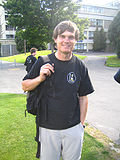
The Free Software Foundation (FSF) grants two annual awards. Since 1998, FSF has granted the award for Advancement of Free Software and since 2005, also the Free Software Award for Projects of Social Benefit.

The Free Software Foundation (FSF) grants two annual awards. Since 1998, FSF has granted the award for Advancement of Free Software and since 2005, also the Free Software Award for Projects of Social Benefit.
In 1999 the award for Advancement of Free Software was presented at the Jacob Javits Center European Meeting (FOSDEM). Since 2006, the awards have been presented at the FSF's annual members meeting in Cambridge, Massachusetts.
The Advancement of Free Software award is annually presented by the Free Software Foundation (FSF) to a person whom it deems to have made a great contribution to the progress and development of free software, through activities that accord with the spirit of free software. [1]
Source: Award for the Advancement of Free Software
 Larry Wall, 1998 |  Miguel de Icaza, 1999 |
 Brian Paul, 2000 |  Guido van Rossum, 2001 |
 Lawrence Lessig, 2002 |  Alan Cox, 2003 |
 Theo de Raadt, 2004 |  Andrew Tridgell, 2005 |
 Theodore Ts'o, 2006 |  Harald Welte, 2007 |
 Wietse Venema, 2008 |  John Gilmore, 2009 |
 Rob Savoye, 2010 |  Yukihiro Matsumoto, 2011 |
 Fernando Pérez, 2012 |  Matthew Garrett, 2013 |
 Sébastien Jodogne, 2014 |  Werner Koch, 2015 |
 Alexandre Oliva, 2016 |  Karen Sandler, 2017 |
 Deborah Nicholson, 2018 |  Jim Meyering, 2019 |
 Bradley M. Kuhn, 2020 |  Paul Eggert, 2021 |
Source: The Award for Projects of Social Benefit

The Free Software Award for Projects of Social Benefit is an annual award granted by the Free Software Foundation (FSF). In announcing the award, the FSF explained that:
This award is presented to the project or team responsible for applying free software, or the ideas of the free software movement, in a project that intentionally and significantly benefits society in other aspects of life. [32]
According to Richard Stallman, former President of FSF, the award was inspired by the Sahana project which was developed, and was used, for organising the transfer of aid to tsunami victims in Sri Lanka after the 2004 Indian Ocean earthquake. The developers indicated that they hope to adapt it to aid in other future disasters. [33]
This is the second annual award created by the FSF. The first was the Award for the Advancement of Free Software (AAFS).
The award was first awarded in 2005, and the recipients have been: [34]
The third annual award created by the FSF, the award is presented to an exceptional newcomer to the free software community. [38]
The award was first awarded for 2019 at LibrePlanet 2020, and the recipients have been: